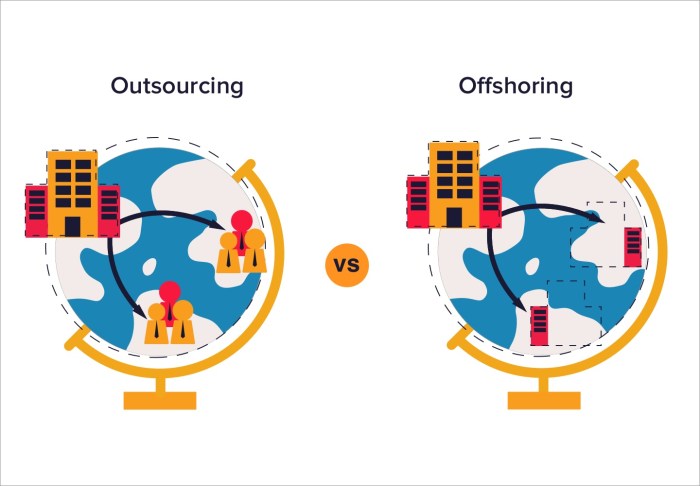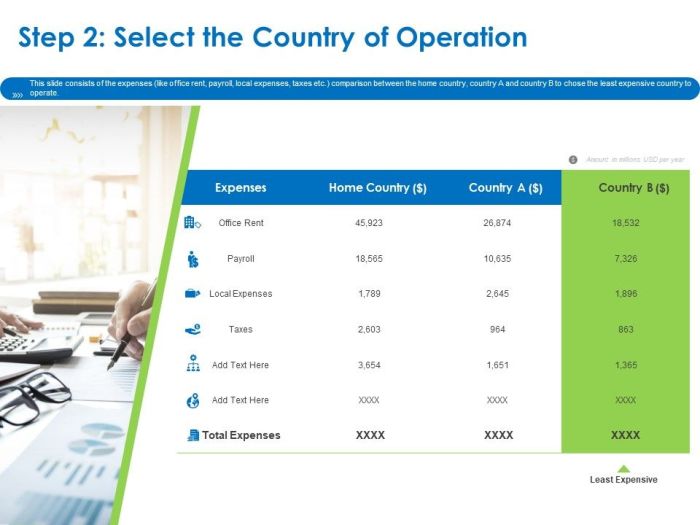Define Offshoring: This exploration delves into the multifaceted world of offshoring, examining its core principles, various types, and the compelling motivations behind this increasingly prevalent business strategy. We’ll navigate the complexities, dissecting the economic benefits, strategic advantages, and inherent risks, while also addressing crucial legal and ethical considerations. Prepare to gain a nuanced understanding of this global phenomenon and its impact on businesses worldwide.
From manufacturing and services to knowledge process outsourcing, we’ll unravel the diverse applications of offshoring, analyzing successful case studies and predicting future trends shaped by technological advancements and geopolitical shifts. This in-depth analysis provides a clear and comprehensive picture of offshoring’s role in the modern business landscape.
Definition of Offshoring

Offshoring is a business practice where a company relocates certain aspects of its operations, such as manufacturing, customer service, or IT, to a different country. This relocation is primarily driven by the potential for cost reduction, access to specialized skills, or improved operational efficiency. The core goal is to leverage the advantages offered by a foreign location to enhance the company’s overall profitability and competitiveness.Offshoring, in its simplest form, involves moving parts of a business to another country.
This might involve setting up a new facility overseas, contracting with a foreign company to perform specific tasks, or a combination of both. The decision to offshore is a strategic one, weighing the potential benefits against the challenges of managing operations across international borders.
Characteristics of Offshoring
Several key characteristics distinguish offshoring from other business practices. Firstly, it involves a geographical relocation of operations across international borders, unlike domestic outsourcing which remains within the same country. Secondly, offshoring often involves a longer-term commitment, as it necessitates establishing infrastructure and relationships in a foreign location. Thirdly, offshoring often necessitates navigating different legal, regulatory, and cultural environments, demanding a higher level of strategic planning and risk management.
Finally, successful offshoring requires robust communication and coordination across geographical boundaries to maintain operational efficiency and quality control.
Comparison of Offshoring and Outsourcing
While both offshoring and outsourcing involve contracting out work, they differ significantly in their geographical scope. The following table highlights these key differences:
| Definition | Offshoring | Outsourcing | Key Differences |
|---|---|---|---|
| Relocation of business processes | Relocation of business processes to a foreign country | Contracting out business processes to a third party | Geographic location; Offshoring always involves a different country, while outsourcing can be domestic or international. |
| Focus | Cost reduction, access to specialized skills, improved efficiency | Cost reduction, access to specialized skills, focus on core competencies | Primary driver; Offshoring’s primary driver is often geographical advantage, while outsourcing focuses more on resource optimization. |
| Control | Can range from high (with wholly-owned subsidiaries) to low (with independent contractors) | Can range from high (with tightly managed contracts) to low (with independent contractors) | Level of control; While both can have varying levels of control, offshoring often requires managing operations across greater distances and time zones. |
| Risks | Higher risks associated with political instability, currency fluctuations, cultural differences, and communication barriers | Risks associated with contract management, quality control, and intellectual property protection | Risk profile; Offshoring generally presents a higher risk profile due to increased geographical and cultural complexities. |
Motivations for Offshoring
Companies choose to offshore operations for a complex interplay of economic, strategic, and operational reasons. The primary drivers often involve a combination of factors, with the relative importance varying depending on the industry, company size, and specific business goals. Understanding these motivations is crucial for comprehending the globalized nature of modern business.
Cost Reduction
Cost reduction is arguably the most significant motivation for offshoring. This encompasses various cost components, including labor costs (often significantly lower in certain countries), operational expenses (such as rent and utilities), and taxation. For example, a technology company might offshore its customer service operations to a country with lower wages, resulting in substantial savings on salaries and associated benefits.
These savings can then be reinvested in research and development, marketing, or other areas crucial for growth. Furthermore, some countries offer tax incentives for foreign investment, further enhancing the cost-effectiveness of offshoring.
Access to Specialized Talent
Beyond cost savings, access to a global talent pool is a key driver. Many countries possess highly skilled workforces in specific sectors, often exceeding the availability of similar expertise in the company’s home country. For instance, a pharmaceutical company might offshore its clinical trial management to a country with a large pool of experienced medical professionals, ensuring faster and more efficient trial execution.
This access to specialized skills can be particularly valuable in industries with high demand for specific expertise.
Market Expansion
Offshoring can significantly facilitate market expansion into new geographic regions. By establishing a presence in a target market through offshoring, companies can better understand local customer needs, adapt their products or services accordingly, and respond quickly to market changes. For example, a clothing retailer might establish a manufacturing facility in a country with a large and growing consumer market, enabling them to produce and sell goods locally, reducing transportation costs and improving delivery times.
This proximity to the market also facilitates quicker adaptation to local trends and preferences.
Strategic Advantages
Offshoring offers several strategic advantages beyond cost and talent acquisition. These include improved operational efficiency through access to 24/7 operations, enhanced flexibility and scalability in response to fluctuating demands, and the ability to leverage different time zones for optimized project management. For example, a software development company might offshore development work to a team located in a different time zone, allowing for continuous development and faster project completion.
This around-the-clock operation capability is particularly beneficial for projects with tight deadlines.
Comparison of Offshoring Benefits
| Benefit | Cost Savings | Access to Talent | Market Expansion |
|---|---|---|---|
| Description | Lower labor, operational, and tax costs | Specialized skills and expertise not readily available domestically | Improved market access, faster response to local needs, reduced transportation costs |
| Example | Manufacturing in a country with lower wages | Outsourcing software development to a country known for its skilled programmers | Establishing a customer service center in a key target market |
| Potential Impact | Increased profitability and return on investment | Improved product quality and faster innovation | Increased market share and revenue growth |
Risks and Challenges of Offshoring: Define Offshoring
Offshoring, while offering significant cost savings and access to a wider talent pool, presents a range of inherent risks and challenges that companies must carefully consider and mitigate. Failure to adequately address these issues can lead to project delays, financial losses, and reputational damage. This section explores the key risks and challenges associated with offshoring, focusing on operational, financial, and ethical considerations, as well as their potential impact on domestic economies.
Potential Risks Associated with Offshoring
Several potential risks are associated with offshoring, including operational inefficiencies, communication breakdowns, security vulnerabilities, and quality control issues. Effective risk management requires a proactive approach that identifies potential problems early and develops robust mitigation strategies. Ignoring these risks can significantly impact project timelines and budgets.
Challenges in Managing Offshore Operations
Managing offshore operations presents unique challenges that differ significantly from managing domestic teams. These challenges often stem from geographical distance, cultural differences, time zone variations, and differing regulatory environments. Effective management requires clear communication protocols, robust project management methodologies, and a deep understanding of the cultural nuances of the offshore team. For example, a lack of clear communication can lead to misunderstandings and project delays, while differences in work ethics can impact productivity and collaboration.
Negative Impacts on Domestic Economies
The offshoring of jobs can have significant negative impacts on domestic economies, leading to job losses in specific sectors and potentially contributing to regional economic decline. This can result in increased unemployment, reduced tax revenue, and a decrease in overall economic activity. However, it’s important to note that offshoring can also create new opportunities, such as in areas related to managing and coordinating offshore operations.
The net effect on a domestic economy is complex and depends on various factors, including the scale of offshoring, the types of jobs moved, and the government’s policies to mitigate negative impacts. For example, the decline of manufacturing jobs in the US Rust Belt has been partly attributed to offshoring, resulting in significant economic hardship for affected communities.
Mitigation Strategies for Managing Offshoring Risks
Effective mitigation strategies are crucial for successfully managing the risks associated with offshoring. These strategies can be broadly categorized into proactive measures, such as careful vendor selection and thorough due diligence, and reactive measures, such as contingency planning and robust escalation procedures. A strong emphasis on communication and collaboration, coupled with regular performance monitoring and feedback mechanisms, is vital for minimizing risks and ensuring project success.
For instance, selecting a reputable vendor with a proven track record and strong quality control processes significantly reduces the risk of encountering substandard work. Similarly, establishing clear communication channels and regular progress meetings can help prevent misunderstandings and address potential issues promptly. Furthermore, developing comprehensive contingency plans to address unforeseen circumstances, such as natural disasters or political instability, is crucial for business continuity.
A comparative analysis of these strategies reveals that a combination of proactive and reactive measures is the most effective approach to managing offshoring risks.
Legal and Ethical Considerations
Offshoring, while offering significant cost and operational advantages, introduces a complex web of legal and ethical considerations that companies must navigate carefully. Failure to do so can result in reputational damage, legal penalties, and operational disruptions. Understanding the legal frameworks governing offshoring and proactively addressing potential ethical dilemmas is crucial for successful and sustainable offshore operations.
Governing Legal Frameworks, Define Offshoring
International and national laws significantly impact offshoring practices. Data protection regulations, such as GDPR in Europe and CCPA in California, dictate how personal data handled by offshore entities must be protected. Intellectual property laws vary across jurisdictions, necessitating careful contract negotiation to safeguard proprietary information. Labor laws in offshore locations determine acceptable working conditions, wages, and employee rights, and non-compliance can lead to severe penalties.
Tax laws also play a crucial role, influencing the overall cost and structure of offshoring arrangements. Companies must ensure compliance with all relevant laws in both their home country and the offshore location. For example, a US-based company offshoring to India must adhere to both US and Indian labor laws, data protection regulations, and tax laws.
Ethical Dilemmas in Offshoring
Ethical dilemmas frequently arise in offshoring. One common challenge is ensuring fair labor practices in offshore locations. Companies may face pressure to compromise on wages, working conditions, or employee rights to reduce costs. Another concern involves data security and privacy. Offshore vendors may not always adhere to the same stringent data protection standards as the company’s home country, potentially leading to data breaches or privacy violations.
Intellectual property theft is another significant ethical risk. Protecting trade secrets and proprietary information when outsourcing tasks to external vendors requires robust contractual agreements and ongoing monitoring. Finally, environmental concerns may arise, particularly in industries with significant environmental impact. Companies must ensure that their offshore partners adhere to responsible environmental practices.
Compliance with Labor Laws and Ethical Guidelines
Compliance with labor laws and ethical guidelines in offshore locations is paramount for maintaining a positive corporate image and avoiding legal repercussions. This involves conducting thorough due diligence on potential offshore partners to assess their compliance record and adherence to ethical standards. Regular audits and monitoring of offshore operations are essential to ensure ongoing compliance. Implementing robust internal controls and ethical codes of conduct can help guide employees’ actions and prevent unethical behavior.
Transparency and open communication with stakeholders, including employees, customers, and investors, are also crucial for building trust and demonstrating commitment to ethical practices. For example, companies might establish independent ethical review boards to oversee offshoring operations and ensure adherence to established guidelines.
Best Practices for Ethical and Legal Compliance
To ensure ethical and legal compliance in offshoring, companies should adopt a proactive and comprehensive approach.
- Conduct thorough due diligence on potential offshore partners, verifying their compliance with relevant laws and ethical standards.
- Develop and implement a comprehensive code of conduct that Artikels ethical expectations for all employees and offshore partners.
- Establish clear contractual agreements that specify data protection measures, intellectual property rights, and labor standards.
- Regularly audit and monitor offshore operations to ensure ongoing compliance with laws and ethical guidelines.
- Invest in training programs to educate employees and offshore partners on relevant legal and ethical requirements.
- Establish mechanisms for reporting and addressing ethical concerns, such as whistleblowing hotlines or independent ethics committees.
- Maintain open communication with stakeholders to foster transparency and build trust.
Case Studies of Offshoring

Successful offshoring initiatives demonstrate the potential for significant cost savings, increased efficiency, and access to specialized skills. However, careful planning and execution are crucial to mitigate risks and achieve desired outcomes. Examining real-world examples provides valuable insights into effective strategies and best practices.
Successful Offshoring Initiatives: Examples and Strategies
The following table showcases companies that have successfully implemented offshoring strategies, highlighting their approaches and the resulting benefits. These examples illustrate the diversity of industries and approaches that can lead to successful offshoring.
| Company | Industry | Strategy | Outcome |
|---|---|---|---|
| Tata Consultancy Services (TCS) | Information Technology | Focus on building strong client relationships, investing heavily in employee training and development in offshore locations, and implementing robust project management methodologies. They also emphasize cultural understanding and communication. | Significant growth and market leadership in the IT services sector, demonstrating the effectiveness of their global delivery model. They have consistently delivered high-quality services at competitive prices. |
| Accenture | Management Consulting and IT Services | Leveraging a global network of delivery centers, Accenture employs a phased approach to offshoring, starting with simpler tasks and gradually increasing complexity as trust and efficiency improve. They prioritize rigorous quality control and communication protocols. | Expansion of service offerings, improved cost efficiency, and increased capacity to handle large-scale projects. Their global reach allows them to serve clients across various time zones. |
| GE | Conglomerate (various industries) | GE’s offshoring strategy involves a combination of factors, including establishing global centers of excellence for specific functions, fostering collaboration between onshore and offshore teams, and implementing standardized processes. | Cost reduction, improved operational efficiency, and access to a global talent pool. Their diversified approach allows them to tailor offshoring strategies to the specific needs of each business unit. |
| IBM | Information Technology | Similar to TCS and Accenture, IBM utilizes a global delivery model, emphasizing strong communication, collaboration, and standardized processes across its various locations. They invest significantly in training and development for their offshore workforce. | Maintaining a strong competitive position in the IT services market, demonstrating the long-term viability of their offshoring strategy. They have been able to successfully manage a large-scale global workforce. |
Ultimately, understanding “Define Offshoring” requires a holistic view, encompassing the financial incentives, strategic opportunities, and inherent challenges. While cost savings and access to talent are significant drivers, careful consideration of risks, ethical implications, and legal frameworks is paramount. By adopting a proactive and informed approach, businesses can harness the potential benefits of offshoring while mitigating potential downsides, ensuring long-term success in an increasingly interconnected global market.

